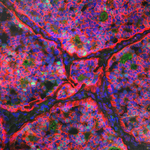New biomarkers found for diagnosis and treatment of triple-negative breast cancer
KYOTO, Japan–(BUSINESS WIRE)–COGNANO, Inc. (Kyoto, Japan) and associates announced the discovery of a panel of antibodies specific for triple-negative breast cancer (TNBC). Breast cancer was the second leading cause of death for American women in 2022. To date, the three markers (Her2, ER and PgR) have been used for diagnosis that has increased life expectancy for many patients. However, patients with low expressions of these markers are diagnosed with TNBC and have the worst prognosis. The authors obtained a panel of antibodies indicating TNBC cancer cells through a computational approach using the genetic database from immunized alpacas. The results also signify the discovery of multiple new target molecules suitable for TNBC treatment. The authors mention COGNANO’s algorithm can discover therapeutic targets to solve any malignancies defined as unmet medical needs.
The research was published on the bioRxiv preprint server on February 23, 2023.
Title: Statistical mining of triple-negative breast cancer-specific nanobodies among huge libraries from immunized alpacas.
Authors: Ryota Maeda, Hiroyuki Yamazaki, Ryoga Kobayashi, Seishiro Yamamoto, Kazuki Kasai, Akihiro Imura* (*Correspondence author)
DOI: 10.1101/2023.02.23.529685
URL: https://www.biorxiv.org/content/10.1101/2023.02.23.529685v1
-
Background
Over the past 40 years, efforts have yielded breakthrough drug discovery targets such as Her2, EGFR, PD1-L, and OX40. Currently, �precision medicine� that delivers drugs to target molecules supported by engineering such as �ADC: antibody-drug conjugate� and �CAR-T� is mainstream. On the other hand, there remain some types of cancer, such as pancreatic cancer and bile duct cancer, for which there are still no significant treatments, and these are called unmet medical needs. The most feared is triple-negative breast cancer (TNBC), a population with low expression of known biomarkers such as Her2 and hormone receptors, accounting for 15% of breast cancers. The COGNANO team set out to discover candidate molecules for therapeutic targets in TNBC. At least hundreds of thousands of proteins are expressed in humans. Searching for rare molecules only expressed on cancer cells requires a huge database as well as search power. The immunity of living organisms is considered to be the best system to satisfy this requirement. At present, the enormous probing power of the immune system cannot be replicated in wet labs or in silico. -
Methods and results
They immunized a camelid alpaca with more than 10 of TNBC cell lines, continuously collected antibody-producing cells, and established a genetic library of single-domain antibodies. They then expressed the antibody genes in phagemids and constructed a digital database sorted according to their affinity to each cell line. Antibody groups with a significant affinity for TNBC cell lines were materialized as candidates and their efficacy was confirmed in actual patient tissue sections. As a result, they were able to find malignant cells in the tissues of TNBC patients. These antibodies and novel biomarkers will enable the rapid and easy development of �precision medicine� against TNBC. -
Influence and effect
?Discovery of biomarkers that can diagnose TNBC
?Discovery of therapeutic target molecules that can treat TNBC
?Possibilities of new treatment methods based on engineering such as CAR-T and ADC
?Establishment of statistical algorithms to search for novel biomarkers on unmet medical needs -
Perspectives
VHH drug discovery developed by Ablynx has been released by Sanofi and is already helping many patients. Recently, it is also known that many VHH development teams, including COGNANO, have proposed therapeutic drugs for SARS-CoV2 and have shown excellent specifications. Mutations also change the reactivity with antibodies, but COGNANO’s VHH antibodies are currently attracting attention as the only antibody in the world that can respond to all the variants of concern (Communications Biology 5, Article number: 669 (2022)). As a result of statistical selection from the SPIKE affinity antibody library consisting of a huge number of VHH clones, they were able to obtain an antibody robust against variants. In parallel, they identified rare TNBC biomarkers from its database by constructing a huge library of gene that encodes antibodies that recognize cancer cells. This achievement is based on the technique of mining by mathematical processing. It is a technology that can be applied to solve other diseases than TNBC and thus is a platform invention that enables a rapid transition to antibody drug discovery. The authors mention that pancreatic cancer, cholangiocarcinoma, glioblastoma, undifferentiated thyroid cancer, sarcoma, etc. will be the next target, and the team declares to develop 2-3 new solutions every year.
Glossary
VHH antibody
Abbreviation for Variable domain (VH) of heavy chain antibody. Ordinary antibodies consist of a combination of two chains, but camelid animals such as alpacas have unique antibodies consisting of only heavy chains, and even if only the antigen-binding site (VH) is taken out, the antigen-binding activity is still retained, it has attracted attention as a VH domain of heavy chain, that is, a small VHH antibody.
Big data
A huge data group that is difficult for humans to grasp as a whole. In biotechnology, genome sequences and vast numbers of mRNA sequences, which correspond to blueprints for highly diverse antibody molecules, are equivalent to big data. When an alpaca is inoculated with an antigen (in this case, the coronavirus spike protein), it produces billions or more of VHH antibodies against that antigen. From this big library (like choosing a book in a library), it is necessary to devise a way to select practically suitable ones in a short time. Developed and patented.
Contacts
COGNANO, Inc.
Akihiro Imura, +81-75-741-6962
[email protected]








